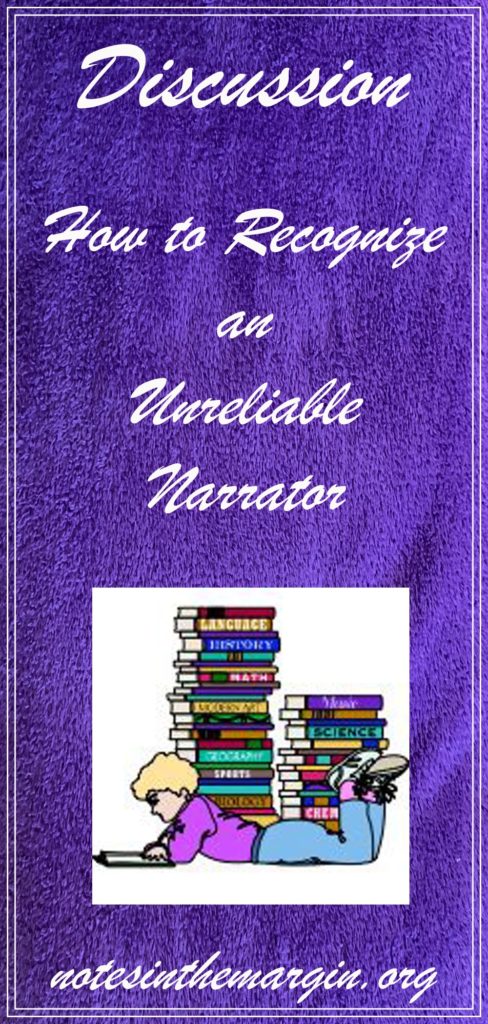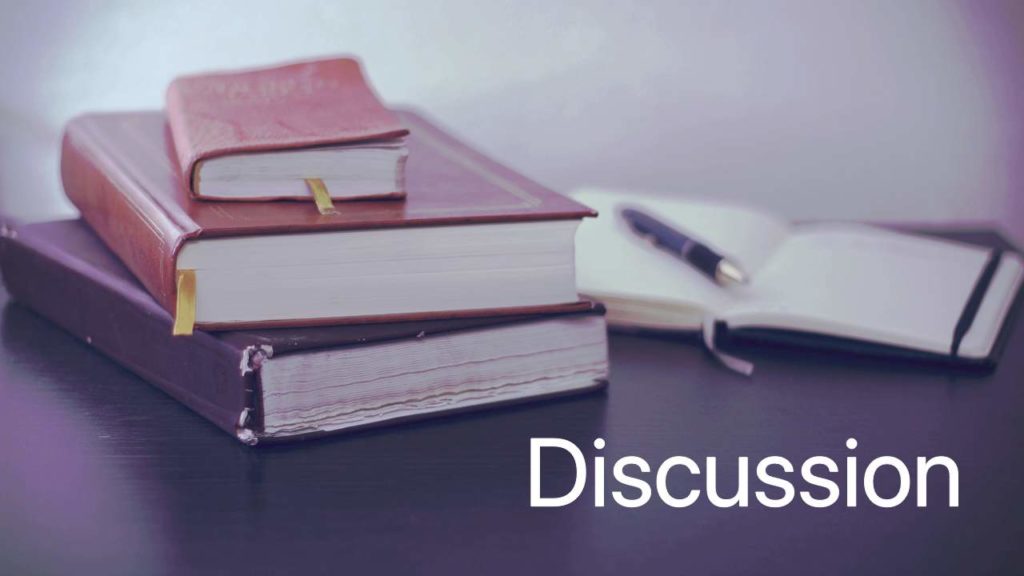
Thanks to these two bloggers for sponsoring the 2020 Blog Discussion Challenge:
- Nicole at Feed Your Fiction Addiction
- Shannon at It Starts at Midnight
You can join the discussion challenge at any time during 2020 by clicking on either link above.
Here’s a question that comes up periodically on literary sites:
I’m having trouble reading books with unreliable narrators. How exactly do you know a narrator is unreliable?
When I saw the question again recently, I realized that, although the question gets asked a lot, I don’t think I’ve ever seen an answer.
It’s a hard question to answer for two related reasons:
- The discussion requires specific examples as illustration.
- Naming the source as an unreliable narrator gives the whole thing away.
Since I try to keep this blog free of spoilers, I’m going to try to answer the question without citing specific texts. So please put up with my silly, contrived examples. Most of them I’ve completely made up, and others I’ve lifted and generalized from real sources.
But before we start, some definitions. A narrator is the one telling the tale. Sometimes narrators inadvertently deceive readers, such as children who report events that they are too young to understand the meaning of. These are called naive narrators. But unreliable narrators fail to provide readers with adequate information from which to make inferences and judgments. Sometimes these narrators may be a bit naive (that is, they may not provide certain information because they don’t know it), but most often—and, most interestingly—unreliable narrators deceive readers for their own purposes.
The considerations here aim to help you uncover the willfully unreliable narrators, the ones that have some personal reason for controlling the information they dole out to readers. Remember, though, that these narrators may be lying to themselves as much as to the readers.
Here are some examples that suggest a narrator may not be telling you the whole truth.
Inconsistent Details
“What a tangled web we weave when first we practice to deceive.”
As with people in real life, often the first indication that a narrator is deceiving us is an inconsistency in details over time. Sometimes these inconsistencies involve seemingly small details: “My mother died when I was five years old” vs. “My mother died when I was in high school.” Other times the differences may comprise whole chunks of the narrator’s life story, such as education, work experience, and marital history.
Inconsistent details are often the first and most tell-tale indications that things in this narrative may not be as they seem.
Unexplained Details
I recently read a thriller in which the narrator said, almost as an aside, “My husband handed me my medication and a glass of water to swallow the pills with.” This struck me as odd, but it wasn’t until the second time she said the same thing that all my alarm bells went off:
- What exactly is this medication?
- What disease or condition is it used to treat?
- Why is her husband (who is not a doctor or nurse) dispensing this medicine to her? Why isn’t she in charge of her own medication?
- What are the possible side effects of this medication?
- What are the potential effects of taking either too much or too little of this drug?
What isn’t being said is often just as important as what is being said. Ask yourself the questions and examine the narrative’s lack of answers.

The Narrator’s Interactions with Other Characters
A narrator’s interactions with the novel’s other characters may suggest reasons for his behavior. Does the narrator act arrogant toward some characters but subservient or fearful toward others? Why?
Sometimes other characters, particularly minor ones whose number of appearances is limited, may feature in the novel for the primary purpose of providing some other viewpoint against which to measure the narrator’s actions. One novel I read not too long ago involved a first-person male narrator who became fascinated by, then obsessed with a woman visiting his town. Near the end of the novel his female family friend tells him, “My father and I tried to tell you her behavior was suspicious.” This remark provides an external yardstick against which readers can evaluate the narrator’s reaction to the visitor. This minor character lets us know we were right in our suspicions about the narrator, that other people shared our concern over how he fell under the influence of this visitor.
Change in Narrator’s Voice
How the narrator acts, thinks, and speaks over the course of the novel can also clue readers in to an unreliable narrator. A narrator may start out sounding logical and rational, but narration that gradually becomes more chaotic and desperate could indicate a decline in the narrator’s mental state.
Writing an effective unreliable narrator challenges writers’ skills. The author must sprinkle suggestions that raise our suspicions over the narrative like salt, while at the same time planting enough red herrings to keep us guessing and turning the pages.
Recognizing unreliable narrators is just as challenging for readers as creating them is for authors. You can’t skim or speed read here. Slow, careful reading, paying attention to every detail and asking unanswered questions, is necessary to recognize when a narrator isn’t playing straight with you.
The most skilled authors dish out their clues about the nature of the narrator slowly and subtly. Appreciating that process and recognizing an unreliable narrator can be one of the most satisfying rewards of reading fiction.
© 2020 by Mary Daniels Brown

